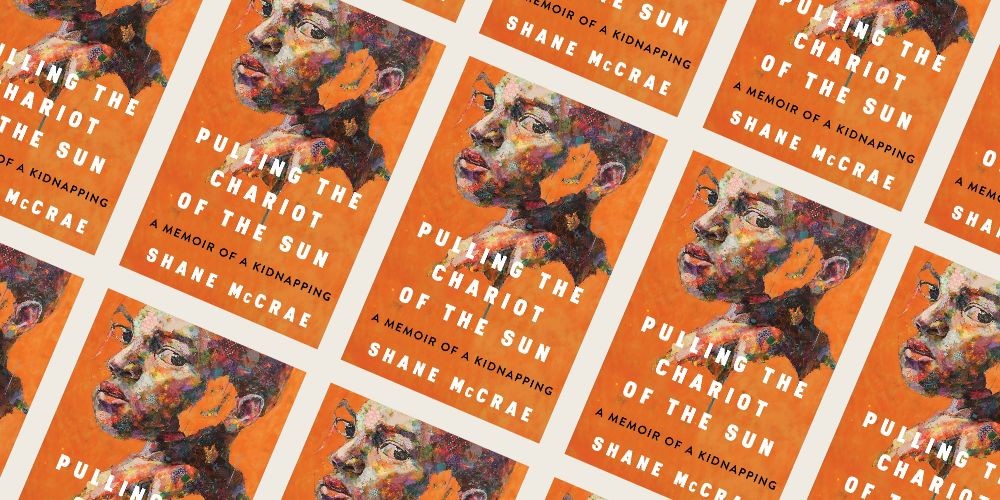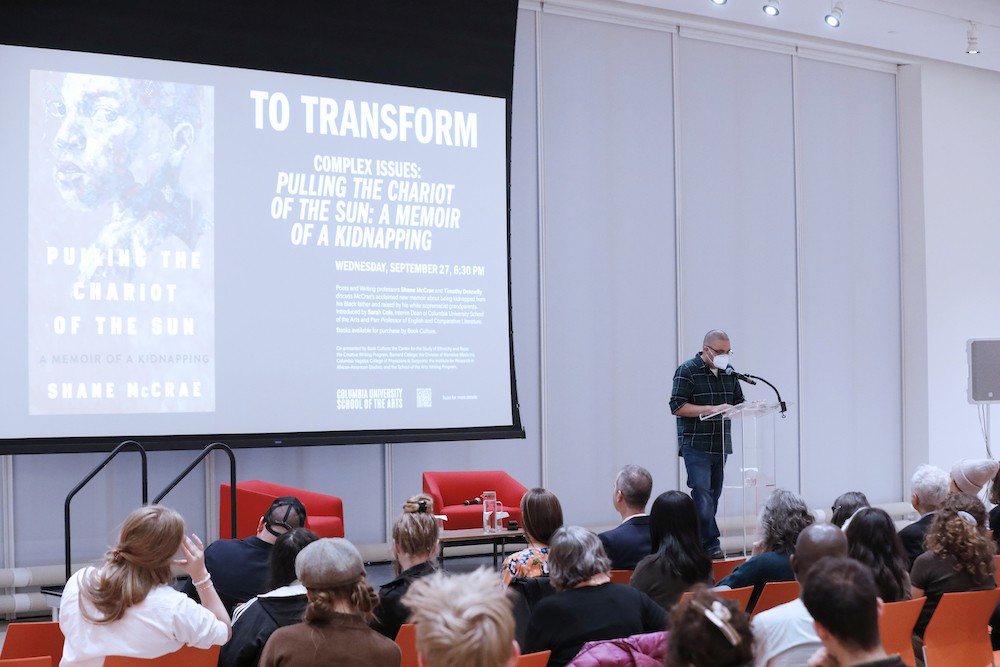From Poet to Memoirist: Professor Shane McCrae Explores Restoration and Reinvention in New Book
He was kidnapped from his Black father and raised by his white supremacist grandparents as a three-year-old, then later found his voice as a writer, living “inside poetry” by the time he was a teenager. Now, with the release of his new book, Pulling the Chariot of the Sun: A Memoir of a Kidnapping, Associate Professor of Writing Shane McCrae is reconstructing his own story and meditating on what it means to form his own identity.
On September 27, 2023, as part of the School of the Arts's 2023-2024 public program and engagement series, Professor Timothy Donnelly joined McCrae for a conversation on memory, family, truth-finding, and boundary-pushing. Presented in the Lenfest Center for the Arts, the event was an installment of Complex Issues , a conversation program dedicated to exploring difference, visibility, and representation through recent work by faculty members. The series centers conversations that invite questions of racial, ethnic, gender, economic, sexual, religious, and cultural complexity—examining their articulation across disciplines and genres today.
In her introductory remarks, Interim Dean of Faculty Sarah Cole described McCrae’s work as “powerfully and profoundly about the past.
“Professor McCrae’s poetry and now his memoir burst into our national conversation—a conversation about race, family, trauma, and restoration—with a compulsive force,” Cole said. “I imagine that this moving story and its brilliant author will have a palpable and lasting effect on our world.”
McCrae read an excerpt from his memoir to audience members, where he referred to his kidnapping as “the great wound” at the beginning of his life. He detailed the difficulty he faced as a teenager in imagining a future for himself. While McCrae’s peers entertained thoughts about the lives they might someday lead, McCrae felt certain that he’d never recover from his current life, questioning: What was beyond eighteen?
“When I was a teenager, I couldn’t imagine growing up,” McCrae read. “I didn’t aspire to be more than the harm done to me. I didn’t want to outgrow it. My grandfather had started beating me almost immediately after my grandparents kidnapped me. The chain of beatings bound me to the kidnapping…and before the beginning of my life, before the kidnapping, I was waiting still, unharmed, not a separate self, but my actual self, my whole self, from which fragments proliferated forward through time as me.”
Following the reading, Donnelly and McCrae discussed McCrae’s family dynamics, delving into the manipulation McCrae endured while coming of age with his grandparents and the path to his eventual reunion with his father. Donnelly later pointed out that McCrae had told parts of the story in short prose pieces in his 2016 collection, In the Language of My Captor. He wondered, why had McCrae returned to the material?
McCrae laughed, sharing his decades-long attempts at giving his experiences the “longer prose treatment.” It wasn’t until 2020 that McCrae committed to building and shaping the work. Once McCrae began writing in earnest, he followed a disciplined, almost mathematical approach.
“I Googled how many words it would take to write a 250-page book,” McCrae said, “and Google told me 60,000.”
Through memoir, McCrae was able to tell his story in new ways that were both challenging and exciting. The difference in genre carried with it certain “truth claims,” McCrae explained. “My memory is tremendously bad,” he said. “I wanted the book to be honest [and] since I can’t pretend I remember everything, it’s sort of layered with possibilities.”
Donnelly noted the lyricism and the distinct stylization that animate both McCrae’s poetry and prose.
“As in your poems, the writing in the book retraces its steps,” Donnelly said. “It doesn’t so much retract things as state them a little bit differently. [It] makes adjustments or blows uncertainty into its weave, makes thought or statement seem precarious, trepidatious, but—in its rhythms and sonic arrangements—also very beautiful and effervescent, at times like an arpeggio.”
The evening concluded with a Q&A, where McCrae responded to audience members with candor. When asked about his personal reckoning with his identity, he admitted that he hadn’t “really done any of that yet.” When asked about how he approached talking to family members about his nonfiction, he joked: “I appreciate that your question assumes that I’m a better person than I am.” That same warmth and humor infuse Pulling the Chariot of the Sun, creating an unforgettable reading experience.
The book is available for purchase here.

